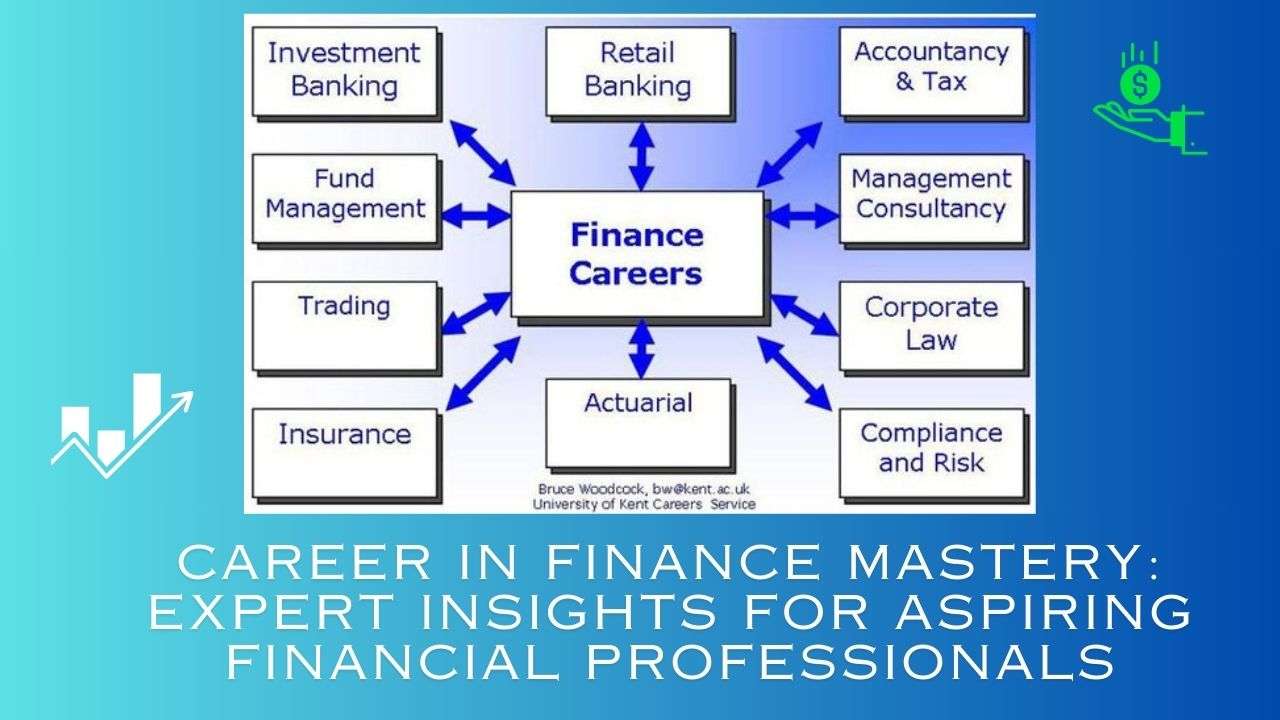Career in Finance Mastery: Expert Insights for Aspiring Financial Professionals
In today’s competitive landscape, defining a career in finance goes beyond numbers; it’s about mastering a dynamic field crucial to the global economy. Let’s explore the significance and diverse opportunities that await those venturing into the realm of finance careers.
Key Skills for a Successful Finance Career
Developing Analytical Skills for a Career in Finance
For a thriving career in finance, honing analytical skills is paramount. Professionals adept at dissecting complex financial data stand out in a competitive landscape.
The Importance of Attention to Detail in Finance Professions
In the intricate world of finance, attention to detail is non-negotiable. Professionals who meticulously scrutinize documents and ensure accuracy thrive in their finance careers.
Communication Skills: A Critical Asset in Your Finance Career
Beyond numbers, effective communication distinguishes successful finance professionals. Whether dealing with clients or stakeholders, clear communication is key in a career in finance.
Navigating Ethical Dilemmas: A Key Aspect of a Career in Finance
Ethical judgment is the backbone of a trustworthy career in finance. Making ethically sound decisions, even in challenging situations, defines successful finance professionals.
Educational Paths in Finance
Choosing Academic Degrees That Propel Your Career in Finance
A solid academic foundation is essential for a thriving career in finance. Degrees in finance, accounting, or economics provide the knowledge base required.
Boosting Credibility: Professional Certifications for a Career in Finance
Elevate your finance career by obtaining professional certifications like CFA or CPA. These credentials enhance credibility and open doors to specialized roles.
Continuous Learning: Staying Ahead in Your Finance Career
In the ever-evolving finance landscape, commitment to continuous learning is vital. Staying abreast of industry trends through workshops and further education ensures success in your finance career.
Specializations in Finance
Investment Banking: A Thriving Career Path in Finance
For those seeking excitement in finance, investment banking offers a thrilling finance career involving mergers, acquisitions, and capital raising.
Crafting Financial Futures: The World of Financial Planning
Financial planning is a rewarding specialization within a finance career, focusing on creating strategies for savings, investments, and retirement.
Risk Management: A Vital Role in Your Finance Career
Risk management professionals play a crucial role in identifying, assessing, and mitigating potential risks, making it a sought-after specialization in finance careers.
Corporate Finance: Navigating the Financial Landscape of Corporations
Managing financial aspects of corporations, corporate finance professionals oversee budgeting, forecasting, and financial reporting in their finance careers.
Career Progression in Finance
Launching Your Career in Finance: Entry-Level Positions
Embarking on a career in finance often starts with entry-level positions, allowing individuals to gain hands-on experience and build foundational skills.
Climbing the Ladder: Mid-Level Management in Finance
As experience grows, finance professionals ascend to mid-level management roles, overseeing teams and contributing to strategic decision-making in their finance careers.
Reaching the Pinnacle: Executive Positions in Your Finance Career
Seasoned finance professionals can reach executive levels, such as CFO or CEO, where they play pivotal roles in shaping organizational success in their finance careers.
Entrepreneurship in Finance: Carving Your Path in the Financial World
Venturing into entrepreneurship allows finance professionals to apply their skills, creating and managing their financial ventures within their finance careers.
Challenges and Rewards
Navigating Industry Challenges in Your Finance Career
In the competitive landscape of finance careers, professionals face challenges such as market volatility, regulatory changes, and ethical dilemmas.
Balancing Act: Personal and Professional Rewards in Finance Careers
Despite challenges, the rewards in finance careers are substantial, including competitive salaries, career advancement, and the opportunity to shape financial landscapes.
Work-Life Harmony: Addressing Challenges in a Finance Career
Maintaining work-life harmony is an ongoing challenge in finance careers. Successful professionals share strategies for balancing personal and professional lives.
Tips for Building a Successful Career in Finance
Networking Strategies for Advancement in Your Finance Career
Building a robust professional network is essential for advancing in your finance career. Attend industry events, connect on professional platforms, and seek mentorship.
Crafting a Standout Resume for Your Finance Career
Crafting a compelling resume is crucial for success in finance careers. Highlighting skills, achievements, and relevant experience sets professionals apart in the competitive landscape.
Staying Relevant: Tips for Keeping Up with Trends in Finance
In the fast-paced world of finance careers, staying informed about technological advancements, regulatory changes, and market trends is crucial for success.
Embracing Technology: A Catalyst for Success in Finance Careers
Embracing fintech tools and staying tech-savvy is imperative for finance careers. Automation and artificial intelligence are reshaping finance, and those adapting thrive.
Future Trends in Finance Careers
Technological Integration in Finance: Adapting to the Future
Technological advancements like blockchain and artificial intelligence are reshaping the future of finance careers. Adapting to these changes is essential for sustained success.
Sustainable Finance: The Evolving Landscape of Ethical Finance Careers
With a growing focus on sustainability, finance careers are increasingly involved in ethical investing, green financing, and corporate responsibility.
Remote Work Opportunities in Finance: Embracing the New Normal
The COVID-19 pandemic has accelerated remote work trends in finance careers, providing professionals with flexibility beyond geographical constraints.
Real-Life Success Stories
Insights from Successful Finance Professionals: Interviews and Lessons–
Complete Roadmap for Making a Successful FINANCE Career! (July 2023)
Highest Paid Finance Career | Highest Paying Jobs in India | Career in Finance
Interviews with finance professionals who have navigated challenges provide inspiration and practical advice for those considering a career in finance.
Learning from the Best: Advice from Seasoned Finance Professionals
Conclusion
Embarking on a career in finance is a journey filled with challenges, rewards, and continuous learning. As the finance sector evolves, professionals must stay adaptable, ethical, and technologically savvy to thrive in this dynamic landscape.
CAREER IN FINANCE : FREQUENTLY ASKED QUESTIONS-
Q 1- What educational background is ideal for a career in finance?
A degree in finance, accounting, or economics provides a solid foundation. Professional certifications like CFA or CPA enhance credibility.
Q 2 –How can finance professionals maintain work-life balance?
Strategies include effective time management, setting boundaries, and prioritizing self-care.
Q 3 – Are there remote work opportunities in the finance sector?
Yes, the finance sector has embraced remote work, providing professionals with flexibility.
Q 4- What are the key challenges faced by finance professionals?
Challenges include market volatility, regulatory changes, and ethical dilemmas
Q 5- How can one build a successful network in the finance industry?
Attend industry events, connect on professional platforms, and seek mentorship for a strong network.
Q 6- What are the major areas of finance?
The field of finance comprises three primary divisions: personal finance, corporate finance, and public (government) finance. Individuals and businesses utilize financial services to obtain financial products and accomplish their financial objectives.
Q 7- What is the scope of finance?
The extent is outlined as follows. Personal finance involves independently handling finances to build wealth and achieve financial objectives. This encompasses budgeting, saving, investing, taxes, insurance, retirement, and estate planning. Corporate finance, on the other hand, focuses on how companies acquire, invest, and oversee capital to optimize shareholder value.
Q 8- What is finance in MBA?
Attaining an MBA degree with a specialization in Finance provides students with diverse prospects in the financial sector. Throughout the program, students gain skills in analyzing corporate reports, predicting economic trends, implementing strategies to enhance stock value, selecting investment portfolios, and managing the delicate equilibrium between risk and profitability.











